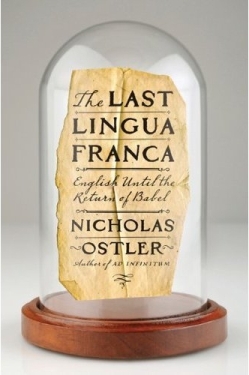- HOME
- INTRO TO THE FORUM
- USE AND MISUSE
- BADLY WRITTEN, BADLY SPOKEN
- GETTING
TO KNOW ENGLISH - PREPARING FOR ENGLISH PROFICIENCY TESTS
- GOING DEEPER INTO ENGLISH
- YOU ASKED ME THIS QUESTION
- EDUCATION AND TEACHING FORUM
- ADVICE AND DISSENT
- MY MEDIA ENGLISH WATCH
- STUDENTS' SOUNDING BOARD
- LANGUAGE HUMOR AT ITS FINEST
- THE LOUNGE
- NOTABLE WORKS BY OUR VERY OWN
- ESSAYS BY JOSE CARILLO
- A Unified Approach To The Proper Use Of Punctuation In English - III
- Steeling Ourselves Against Common Subject-Verb Disagreement Pitfalls
- The Appropriate Way To Position Subordinate Clauses And Phrases
- Please Don’t Wish Me ‘More Power!’
- Let’s Say Goodbye To Those Irritating English Clichés
- Some Guideposts For Positioning Adjectives In English Sentences
- ABOUT JOSE CARILLO
- READINGS ABOUT LANGUAGE
- TIME OUT FROM ENGLISH GRAMMAR
- NEWS AND COMMENTARY
- BOOKSHOP
- ARCHIVES
READINGS IN LANGUAGE
This new section features links to interesting, instructive, or thought-provoking readings about the English language. The selections could be anywhere from light and humorous to serious and scholarly, and they range widely from the reading, writing, listening, and speaking disciplines to the teaching and learning of English.
Days of English as global language numbered, says British scholar
Are the days of English as the global language of knowledge, commerce, and science numbered? Yes, they are, says the British linguistics scholar and author Nicholas Ostler in his forthcoming book, The Last Lingua Franca: English Until the Return of Babel (Walker & Company, 262 pages). But in the provocative and fascinating book that’s scheduled for release in late November, Ostler predicts that English will not die but just recede as a language of choice. “It will still be widely spoken, if no longer worldwide, sustained by America’s continued power on the world stage,” he argues. “But its decline will be both symbolic and significant, evidence of grand shifts in the cultural effects of empire.” Indeed, he foresees that English will be the last lingua franca, but one not to be replaced by any other language for that distinction because translation software will let everyone communicate directly without learning a common language.

According to Ostler, there are three emergent trends that point to the ultimate decline of English and other lingua francas. First, worldwide movements towards equality in society will downgrade the status of elites, and because elites are the prime users of nonnative English, the language will gradually retreat to its native-speaking territories. Second, the rising wealth of Brazil, Russia, India, and China will challenge the dominance of native-English-speaking nations, thus shrinking the international preference for English. Third and last, new technologies will at the same time allow instant translation among major languages, thus enhancing the status of mother tongues and lessen the necessity for any future lingua franca.
“English is on an up at the moment, an up that is probably unprecedented in world history,” Ostler explained in an interview by The Observer’s Robert McCrum last October 31. “But world history is full of languages that have dominated for a time, yet there aren’t too many of them around now. So the essential idea is to see what happened to them and see if this could possibly be relevant to the situation of English, which is the world’s lingua franca today.”
Read Robert McCrum’s interview of Nicholas Ostler in the The Guardian UK now!
ABOUT THE AUTHOR:
Nicholas Ostler, a British scholar and linguist, is chairman of the Foundation for Endangered Languages (www.ogmios.org), a charity that supports the efforts of small communities worldwide to know and use their languages more. A scholar with a working knowledge of 18 languages, he is the author of Ad Infinitum: A Biography of Latin and Empires of the Word: A Language History of the World. Ostler studied at Balliol College, Oxford, where he received degrees in Greek, Latin, philosophy, and economics. He later studied under Noam Chomsky at the Massachusetts Institute of Technology, where he earned his Ph.D. in linguistics and Sanskrit.
RELATED READING:
In “Stories vs. Statistics,” an article he wrote for The Stone forum in the October 24, 2010 issue of The New York Times, Temple University mathematics professor John Allen Paulos takes an oblique look at a few lesser-known contrasts between the two cultures in modern society—the literary and the scientific. He begins by noting that the notions of probability and statistics are not alien to storytelling. “From the earliest of recorded histories there were glimmerings of these concepts, which were reflected in everyday words and stories,” he says. “Consider the notions of central tendency — average, median, mode, to name a few. They most certainly grew out of workaday activities and led to words such as (in English) ‘usual,’ ‘typical,’ ‘customary,’ ‘most,’ ‘standard,’ ‘expected,’ ‘normal,’ ‘ordinary,’ ‘medium,’ ‘commonplace,’ ‘so-so,’ and so on. The same is true about the notions of statistical variation — standard deviation, variance, and the like.”
Read John Allen Paulos’s “Stories vs. Statistics” in The New York Times now!
Click to read comments or post a comment
View the complete list of postings in this section
(requires registration to post)






